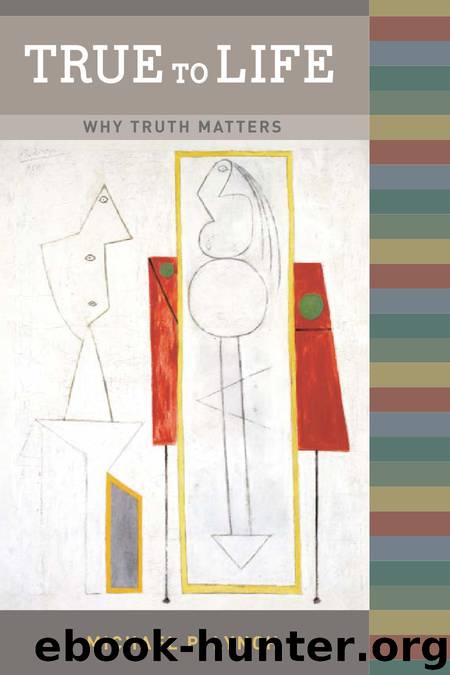True to Life by Michael P. Lynch

Author:Michael P. Lynch [Lynch, Michael P.]
Language: eng
Format: epub
Published: 2011-02-17T05:00:00+00:00
Truth as Fiction
109
But (TN) can’t be derived from the purely nonnormative (T). Therefore, contra minimalism, that schema cannot fully capture everything we believe is true of truth. It can’t capture all the facts about truth.24
Horwich, of course, disagrees. According to Horwich, (T) may not entail (TN) directly, but it does do so given the assumption of certain other obvious facts not involving truth. On this basis, one might claim that whatever else (TN) might be, it is not a substantive fact about truth as such.
According to Horwich, claims about the value of truth are simply more cases of using the word “true” to generalize a more complicated thought.
(TN), in other words, is simply shorthand for our disposition to accept every instance of:
(B)
Other things being equal, it is good to believe that p if and only if p.
Note that (B) doesn’t mention truth at all. In other words, to say that it is good to believe the truth is simply shorthand for saying we are disposed to accept an open-ended stream of little belief norms, namely: It is good to believe that the dog has fleas if and only if the dog has fleas, and it is good to believe that roses are red if and only if roses are red, and it is good to believe that . . . and so on.
The result is that we explain the value of truth in terms that don’t explicitly mention truth. The concept of truth is needed only to help us express that infinite collection of commitments. As a result, the value of truth is either not deeply normative in character after all; or it is deeply normative, but this is de-rivable from the nonnormative T-schema, and hence no threat to minimalism.
This reply does not succeed. If we are to use (B) to help us derive (TN) from (T) then we must be rationally justified in accepting its instances. But if we are willing, a priori, to endorse an infinite list of normative propositions all of which fit a particular pattern, it is highly likely that there is a general, principled reason that we do so. And in my view, the reason we accept (B)’s instances is that we accept (TN); therefore, (B) can’t be used to deduce (TN) itself from (T). Accordingly, (TN) is a fact about truth that minimalism can’t explain. Or so I will now argue.
What is the reason we think that it is good to believe that Socrates was a philosopher if and only if he was, and so on? What, in other words, justifies or rationally explains our acceptance of all the instances of (B)? To see the force of this demand, let’s first look at why one sort of explanation is not going to work. It is not the sort of reply that Horwich himself would make, but 110
Chapter 7
it will help us see the difference between the present call for explanation and a similar one in the case of (T). Suppose we ask why we are inclined, a priori, to endorse every (nonparadoxical) instance of (T).
Download
This site does not store any files on its server. We only index and link to content provided by other sites. Please contact the content providers to delete copyright contents if any and email us, we'll remove relevant links or contents immediately.
| Anthropology | Archaeology |
| Philosophy | Politics & Government |
| Social Sciences | Sociology |
| Women's Studies |
The remains of the day by Kazuo Ishiguro(9000)
Tools of Titans by Timothy Ferriss(8396)
Giovanni's Room by James Baldwin(7346)
The Black Swan by Nassim Nicholas Taleb(7130)
Inner Engineering: A Yogi's Guide to Joy by Sadhguru(6796)
The Way of Zen by Alan W. Watts(6614)
The Power of Now: A Guide to Spiritual Enlightenment by Eckhart Tolle(5784)
Asking the Right Questions: A Guide to Critical Thinking by M. Neil Browne & Stuart M. Keeley(5775)
The Six Wives Of Henry VIII (WOMEN IN HISTORY) by Fraser Antonia(5515)
Astrophysics for People in a Hurry by Neil DeGrasse Tyson(5190)
Housekeeping by Marilynne Robinson(4449)
12 Rules for Life by Jordan B. Peterson(4305)
Ikigai by Héctor García & Francesc Miralles(4275)
Double Down (Diary of a Wimpy Kid Book 11) by Jeff Kinney(4273)
The Ethical Slut by Janet W. Hardy(4253)
Skin in the Game by Nassim Nicholas Taleb(4250)
The Art of Happiness by The Dalai Lama(4130)
Skin in the Game: Hidden Asymmetries in Daily Life by Nassim Nicholas Taleb(4007)
Walking by Henry David Thoreau(3962)
